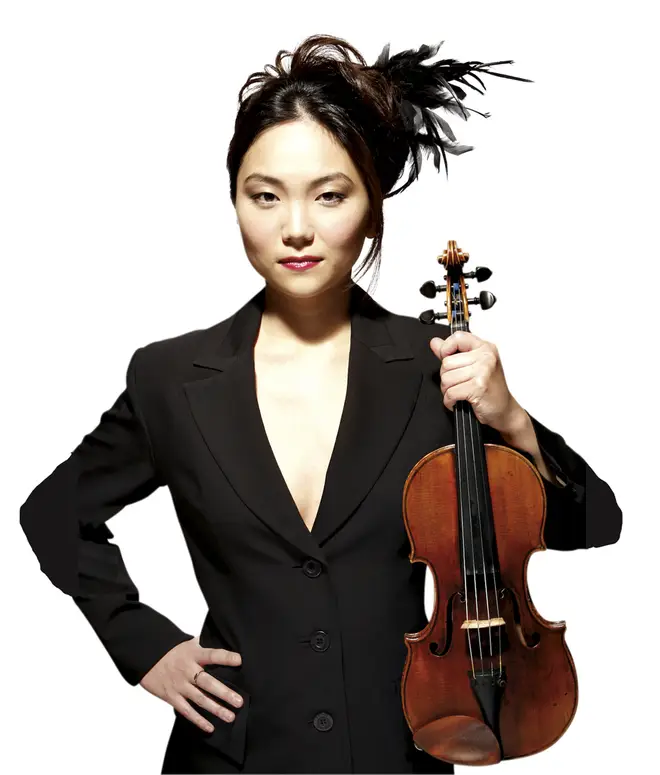On Air Now
Classic FM Breakfast with Aled Jones 6:30am - 9am
12 July 2018, 17:00 | Updated: 18 July 2018, 12:14
Min Kym grew up as an extraordinarily talented violinist, for whom “performing was more normal than being in the playground”. But what is it really like to spend your childhood as a prodigy?
Min Kym is the spellbinding English violinist who has made headlines twice: first in 2010, when her Stradivarius was stolen from a café in Euston station, London, and then in 2017, when she released her book Gone about her life before and after the theft.
But before that, Min was known for being a mind-blowingly good child violinist; at seven, she was accepted as the youngest ever pupil at the Purcell School of Music, and at 16, she was the youngest-ever foundation scholar at the Royal College of Music.
As she prepares to perform at Henley Festival on Saturday 14 July, we asked Min Kym what it was like to be one of the world's top violinists in your teens.
“I started playing the violin when I was six and a half, and the school I was in wasn’t a specialist music school at all. In fact, I was pretty much the only pupil who played classical music.
“I think it was part of my shy, inhibited nature, but I kept my violin life very separate from my everyday life. A year later, I went to the Purcell school. And everything changed. I suddenly felt like something clicked into place. Suddenly, I felt like I belonged and I was in an environment where I was able to play music on a daily basis. It was all-encompassing.”
“To be perfectly honest, at that age I thought everyone was better than me in every sense – whether it was swimming, running, playing the violin or singing. What I was so drawn to was how I felt playing music, and that feeling of emotional freedom.”
“When I went to the Purcell school, the starting age was nine, and I was seven. So I did feel like a bit of a mascot, if you like! But it was difficult to make any comparisons, because the next youngest person was two years older than me.
“But I do remember being very aware of the sound that I wanted to produce, and being drawn to the way the grown-ups played the violin.”

“My day always started with choir. That really shaped my entire love of music, really. I had a wonderful music teacher called Ann Osborne, who instilled such a love of Bach and choral music in me. So we started with aural, choir and singing – but I wasn’t able to practise very much because I had asthma.
“So it was peculiar that the thing I was supposed to be working on was actually making me ill. The longest I could actually play for was about half an hour, before I started to wheeze and convulse. I spent a lot of time in hospital between the ages of 6 and 14, before I grew out of it.
“Because I wasn’t able to practise so much, that’s probably why my teachers thought there might be something different about me.”
“The funny thing is, when I was a child, performing was normal. To perform was more normal than being in the playground – which sounds a bit odd, but the Purcell school was a bit of an odd place! I look back and I think, I didn’t really do that many childhood activities – we just talked about music.”
“I think everything in life has a balance. It was only looking back and writing my memoirs, that I relived my life through a different lens – lived it through adult eyes, not child eyes. I realised that of course there’s a price to pay for performing so young. That level of professionalism you have to learn is not a natural thing, but at the same time the experiences that I had travelling and meeting so many wonderful, inspiring people – I wouldn’t change that for anything.”
“The interest has always been there, and the passion has always been there on a simmering level. Obviously when my violin was stolen, my life came to a halt and I had to evaluate everything. My violin at that point represented my whole life, and I never even questioned that before.
“So it was only when it was gone that I started to unpick my entire existence and realised that there’s a person in here, somewhere. I’m not just a violinist, just a musician. Being a musician is a wonderful thing, of course. But everything I felt, thought, expressed, was through the violin. But now, I feel like I’ve learned to communicate in a different way, not just through the violin.”
“Listen to your instincts. Always listen to your gut. I’ve said this many times, that the turning point of my life was learning to listen to the right voices, the right people, and say no to the things that aren’t so good for me. And once I’d learned to embrace that and got that concept in place, my whole life just turned around.”
This Saturday, 14 July, Min is playing at Henley Festival with the Henley Symphony Orchestra, conducted by Ian Brown. More information and tickets here.
And you can discover more about the story of Min's stolen Stradivarius in this episode of Classic FM's Case Notes podcast.


Promoted by Bounce